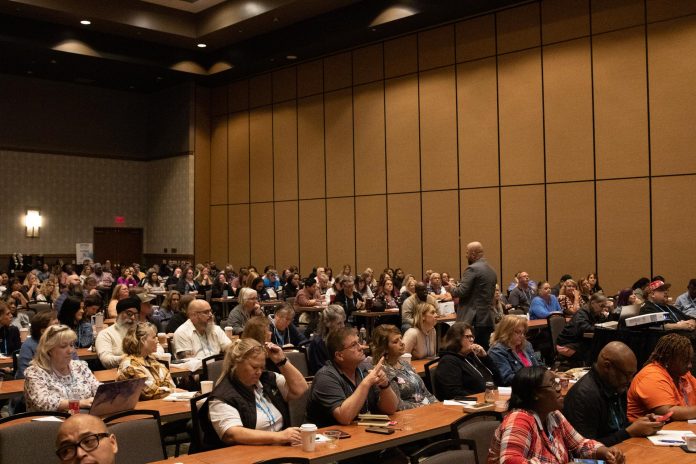FRISCO, Texas — Ben Springer showed TSD Conference attendees the forest through the trees when it comes to affecting positive student outcomes during the opening keynote.
The former special education director for Wasatch County School District in Utah, where he continues to serve as executive director of the Family Education Center, discussed on Thursday his ASPEN on the Bus training — not to be confused with anything forestry related, he said — to address challenging student behavior. He developed the program to team transportation staff with special education teachers using researched-based positive psychology. The goal is to develop strategies to proactively address on-board issues and to create consistency for students.
He noted that student transporters face unique challenges when addressing behavioral issues compared to other school or district staff.
“Driving the bus is hard on a good day,” Springer added.
He should know. While attending the University of Utah as an undergrad, Springer worked as a school bus attendant in Salt Lake City. He recalled an instance during a field trip to the zoo that seared into his brain, and a student with a ruminating disorder who could vomit on cue when agitated.
“For those of you who understand traumatic experiences, this qualifies,” he shared.
After he obtained his Ph.D., Springer set out to create de-escalation training, which led to writing is first book, “Happy Kids Don’t Punch You in the Face.” He saw the need for transportation staff especially to understand student behavior and to communicate more closely with special educators. To his knowledge, he said, ASPEN is the only training of its kind nationwide to address behavior on school buses the same way it’s addressed in classrooms.
Springer referred to ASPEN as his acronym for safety. It starts with asking for assistance and assessing the behavior on the bus, followed by selecting a course of action for both verbal and non-verbal, de-escalation. Next, determine if physical assistance is necessary, which is defined as a real or immediate threat, or one that shows the capability of causing harm. If assistance is required, explain and engage in the physical support. This will allow student transporters to neutrally disengage from the situation once the student and all others are safe.
He said the ASPEN process should be completed by following up with team members within 24 hours of the incident to plan the next steps.
All TSD main conference attendees receive a complimentary individual account to access the ASPEN training, a $595 value, with an option to purchase a district-wide license.
When to Worry:
Behaviors Requiring InterventionNon-compliance
Fighting/arguing
Mean to others
Lying, cheating or stealing
Stubborn or sullen
Moody or sulky
Temper tantrums
Inability to concentrate
Impulsivity
Worry, Anxiety
Swearing, cussing
Teasing
Springer quoted psychologist Gerald Patterson, who co-authored a 1991 paper that Springer said is responsible for the general consensus today that anti-social behaviors in children originate at home with family members, “leading to social failures that in-turn contribute to the long-term maintenance of the child in the antisocial process.” The research spanned nearly a decade and came to predict how behaviors existing at age 1 worsen as the child grows older.
“Parenting is hard and sometimes we make mistakes,” Springer said, adding that language and learning are the most common disabilities for children.
These impact the school day and the school bus ride. Student transporters need the tools to address these resulting behaviors.
Patterson also created the Coercion Cycle, which Springer showed to illustrate how children learn to get what they want through defiance and temper tantrums. When adults give into the “inconvenience” of children, Springer said children learn to continue that behavior, which includes aggression that can remain with them well into adulthood.
Springer recommends consistent, random positive reinforcement to drive improved behavior and mental health. He suggested to attendees that they try setting a timer to remind them to provide positive reinforcement to the people in their lives for one weekend so they can see the impact made on others as well as on themselves.
Similarly, new behavior plans need to be in place for at least 10 days for them to take root. First, transporters need to understand the behavior. This requires compassion, he added. This leads to a plan for addressing the behavior, using an Applied Behavior Analysis (ABA) that identifies the function of behavior and introduces replacement behaviors.
The ABA, Springer shared, starts with the Antecedent — What in the bus environment can be changed to help prevent aggressive behavior? Additionally, he said it is important to determine what in the bus environment cannot be changed.
Next comes the behavior itself. “Everybody can spot bad behavior. It’s not enough,” he said. “We’re supposed to identify new behavior we can teach.” This includes working with school district teams to collect behavior data on the bus, which can unveil student triggers as well as the supports transportation needs. These elements build the one-page behavior plan.
Finally, there needs to be consequences.
“Every behavior, everything we do, too, has a consequence,” Springer said.
The best ally transporters can have in changing behavior are the individual school principals, he added.
Altogether, positive supports lead to happy bus drivers and happy children, allowing all to “Get Rich,” another acronym Springer used to describe the core needs of resources (training, tools, books, technology), intimacy (close, meaningful relationships), competence (sense of humor, availability, determination), and health (diet and exercise).
“The goal is to be content in life,” he concluded. “We need to give this our kids.”
Related: TSD Keynote Speaker to Address Sexual Behavior Concerns on Special Needs Routes
Related: Creating a School Bus No-Bullying Zone
Related: TSD Keynote to Overview Aggressive Behavior, Crisis Management On School Bus
Related: (STN Podcast E177) Support Everybody: Expert Talks Special Education and Transportation














